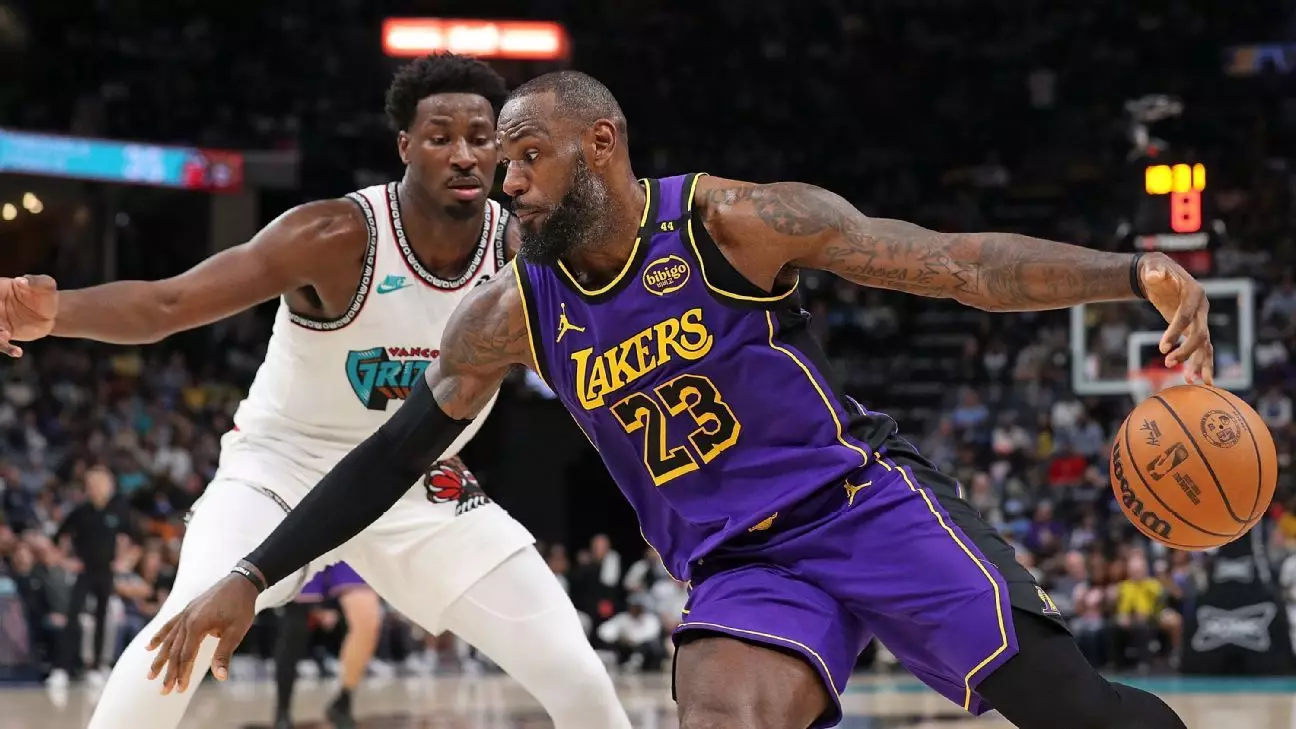The NBA never fails to deliver thrilling performances, and on a recent night in Memphis, the Grizzlies showcased their ability to capitalize on opportunities, particularly in their decisive 131-114 victory over the Los Angeles Lakers. However, the story didn’t simply revolve around Memphis’ prowess; it also highlighted the profound implications of effort and execution that echoed in the postgame discussions.
After the match, Grizzlies’ guard Desmond Bane stole the spotlight during teammate Scotty Pippen Jr.’s postgame interview. Bane made headlines by praising Pippen for his daring play that resulted in stealing the ball from Lakers superstar LeBron James. In a moment that perfectly illustrated team camaraderie, Bane exuberantly remarked on Pippen’s defensive instincts, likening James to an “old man.” This interplay not only boosted team morale but also underscored the shifting dynamics in the Lakers’ locker room, revealing contrasting attitudes toward performance on the hardwood.
Meanwhile, Lakers head coach JJ Redick faced the media with a mix of admiration and frustration after witnessing James put forth a staggering performance—39 points coupled with an impressive shooting percentage. Despite the admiration for James’s relentless drive, which amplified his efforts in the absence of two key teammates—Anthony Davis and Rui Hachimura—Redick couldn’t ignore the broader narrative of his team’s struggle to match that intensity. His comments aimed at rallying the remaining roster members pointed to an urgent need for increased effort, epitomized by his dismissal of their recent underwhelming performance on a five-game road trip.
Redick’s frustrations reflected a deeper concern regarding team effort and accountability. In a bold strategy, he limited D’Angelo Russell’s playing time—a move that sent a clear message about evaluating on-court performance based on effort and engagement. Russell, who managed only 12 points on a dismal shooting night, found himself sidelined in favor of players whose performance better aligned with Redick’s vision of competitive basketball.
As Redick explicitly stated, this wasn’t merely punitive; it was a tactical shift aimed at revitalizing a roster that seemed to falter under pressure. The coach’s decision to adjust playing rotations was underpinned by a desire to rectify a culture of complacency that had seemingly seeped into the team, calling for players to embody the grit that characterizes winning teams.
One of the most glaring issues emphasized by the Grizzlies’ triumph was the Lakers’ defensive struggles, which have become a recurring theme throughout the season. James’s acknowledgment that the Lakers needed to sustain effort across the game encapsulates a harsh truth—their defensive efficiency ranks among the league’s worst. The Grizzlies exploited holes in the Lakers’ defensive structures, taking advantage of breakdowns that allowed for high shooting percentages from both inside and beyond the arc.
While the Grizzlies showcased their offensive capabilities, such as strong shooting and capitalizing on second-chance opportunities, the Lakers’ inability to contain their opponents left the team on thin ice. As a seasoned veteran, James’s perspectives on competition became a rallying cry, urging his teammates to push past their limitations, especially when facing adversity. However, it’s clear that mere words must be matched with consistent effort if the Lakers hope to ascend the standings.
As the Lakers grapple with their identity moving forward, this game served as a reality check. Transitioning from a mindset of relying on individual star performances to one that instinctively prioritizes effort and teamwork will be paramount. For Redick, instilling a culture that does not tolerate lackluster performances is crucial for establishing a winning mentality—one that can convert potential into tangible results.
The Grizzlies’ victory was not merely a statistic in the win-loss column; it intently reflected the starkly different cultures emerging within these teams. Memphis epitomized resilience and teamwork, while Los Angeles faced a reckoning regarding their performance consistency. The coming games will undoubtedly test these lessons, as the Lakers struggle to recalibrate and the Grizzlies look to build momentum in the fiercely competitive landscape of the NBA. The real question lies in which team will learn and adapt the fastest as the season progresses.


Leave a Reply